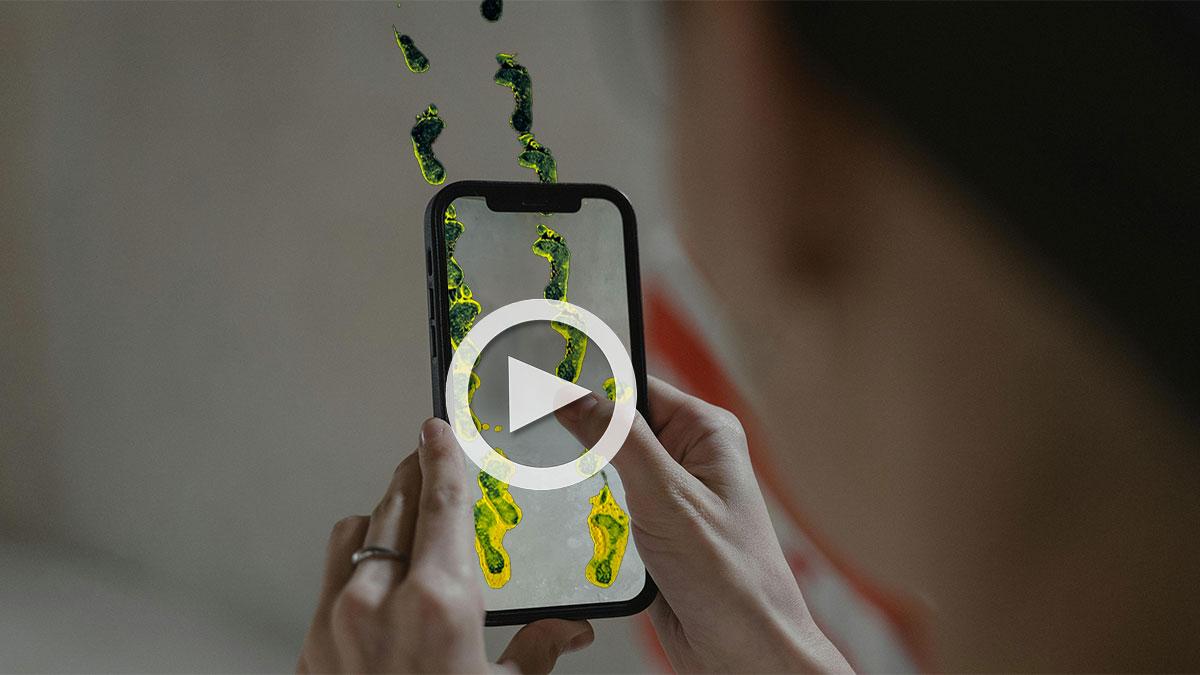The Right to Rehab campaign's immersive digital experience allows you to experience the difference having the right support when you leave hospital can make to your recovery.

In the augmented reality experience Alice’s Road to Recovery, you see the world through the eyes of patient Alice.
A 360-degree soundscape with digital effects blended with your physical reality allows you to experience her story first-hand.
Click on the image above on your smartphone to play Alice’s Road to Recovery, best experienced with headphones. Please note, it does not work on desktops.
- If you encounter any problems then please read our instructions
You can share this with decision-makers to show the power of rehab to add life to years, not just years to life.
From health crisis to recovery
As Alice describes the day she fell ill on a walk, the park she is in is imagined through birds and butterflies flying around you.
As you wake up in hospital after a health crisis, you must work with physiotherapy staff as they help you learn how to walk again.
Through her journey back to health, Alice is helped by a range of rehab professionals including physiotherapy staff.
Alice, rehabilitation patientRehab makes such a massive difference. Physically, but mentally too. I’d be lost without the rehab team. They give me hope.
How to watch Alice’s Road to Recovery
Alice’s Road to Recovery is an interactive experience for your smartphone. Those not used to the technology may find the following step-by-step instructions helpful.
Consider using a smartphone with headphones for the best possible immersive experience. Make sure you have enough room to take six unobstructed steps forward.
Access the experience
- Go to the 8th wall website
- Click Continue, then Allow to give the experience access to your phone’s motion sensors, so you can move around in Alice’s world.
- Click Allow to give the experience access to your phone’s camera, so you can see Alice’s digital world blended with your physical space.
- Under Preferences, you can choose your language, whether or not to have subtitles, and whether you want on-screen text spoken aloud.
- In language, the default choice is English but click on Cymraeg if you would like titles to be in Welsh.
- Slide the button to the right of the word Subtitles to the right if you want subtitles.
- Slide the button to the right of the phrase Text-to-speech to the right if you want all text spoken aloud.
As the voiceover starts, move the phone around to explore the park.
A voice will instruct you to close your eyes, as you share what Alice experienced in hospital. Only do this if it is safe to do so.
In the rehabilitation room, move your phone around to pan 360 degrees around the room.
In the next scene, when the parallel bars appear, find a space where you can take six steps forward, and click the screen to lock the bars in place. Point your phone camera towards the floor. Now place alternate feet over the corresponding footsteps.
When in Alice’s living room, move the phone to pan 360 degrees.
As the scene moves to the therapy wall, move your phone around, watching the screen to pan 360 degrees. How many different professions can you spot?
At the end of the experience, click Share to generate a social media or messenger app post, and let family and friends know you’ve walked in Alice’s footsteps.
Influencing through patient stories
This immersive digital experience sends a powerful message to decision-makers, that they need to help every person like Alice recover as fully and quickly as possible.
It illustrates the human cost of the crisis cycle that sees greater pressure put on GP surgeries and A&E because of gaps in prevention and rehabilitation.
The benefit to patients, the NHS and taxpayers of closing those gaps speaks for itself. If pulmonary rehabilitation alone was expanded to provide an effective service everywhere, the NHS would save £142.6m and see patients spend 194k fewer days in NHS beds.
Alice’s Road to Recovery tells a story applicable to any kind of rehabilitation or prevention, helping to start conversations, continue relationships or act as a focal point of in-person events.
The Right to Rehab campaign is calling for everyone to have the right to rehab no matter who you are or where you live. Because we believe your quality of life should not depend on your postcode.
By sharing Alice’s story with decision-makers in healthcare and policy, we can help make that change happen.